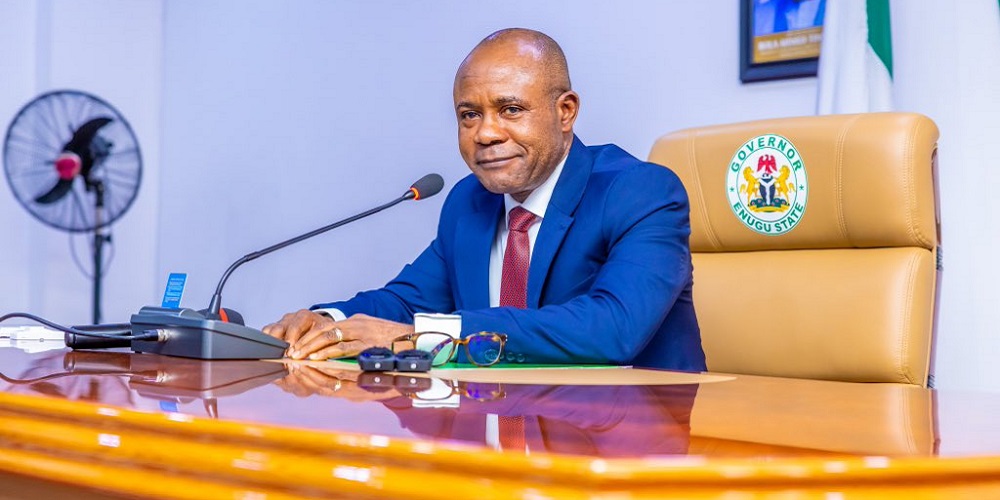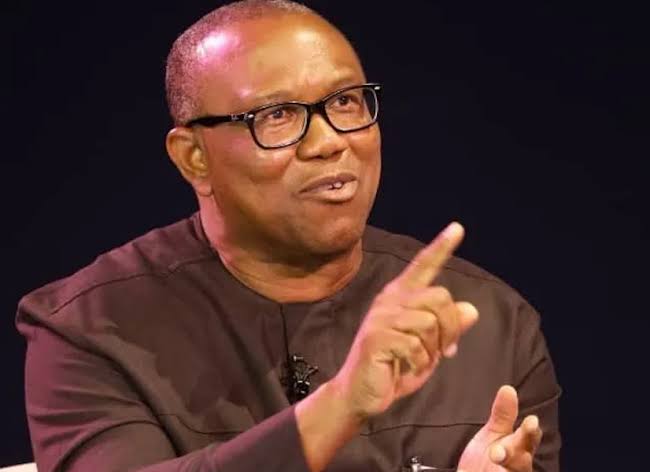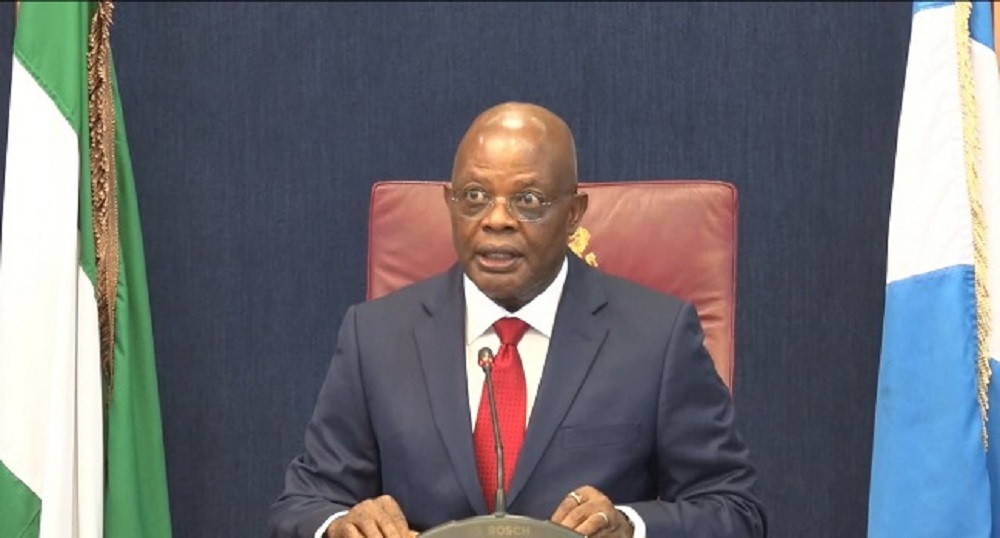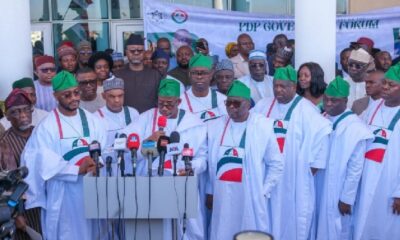News
Enugu gov signs executive order on new urban areas

The Governor of Enugu State, Peter Mbah, has signed Executive Order No. 1, 2025, designating some areas in the state as urban areas. He also signed the Land Use Regulation 2025.
The state government stated in a statement on its website on Friday that the entire Enugu East, Enugu North, and Enugu South Local Government Areas have been designated urban areas by the provisions of the Executive Order, titled “Enugu State Designation of Land as Urban Areas.”
Likewise, the entire Udi, Nkanu West, Nkanu East, and Nsukka Council Areas have been designated as urban areas.
Others created as urban areas are Ndeabor, Oduma Urban Area, Awgu Town, Ihe, Agbogugu, Mgbowo, Isu-Awa, Mmaku, Ituku, and Owelli-Court urban areas as well as Aguobuowa and Oghe in Ezeagu Council Area.
Ogbede, Ukehe, and Aku in Igbo-Etiti; Enugu Ezike in Igbo Eze North Council Area, Ibagwa-Aka in Igbo-Eze South LGA; and Ikem and Eha-Amufu in Isi-Uzo Local Government Area have been so designated
The order equally designated Oji-River, Ugwuoba, and Inyi in Oji-River Council Area; Obollo-Afor and Orba in Udenu Council Area; Umulokpa and Adani in Uzo-Uwani Local Government Area as urban areas.
Speaking on the development, Mbah said, “I have just a few minutes ago signed a Land Use Regulation of 2025, and also an Executive Order designating certain locations of the state as urban areas.
“This is a major and historic milestone that we have just witnessed. It aligns with what we witnessed a few weeks ago when we formally launched the Enugu State Geographic Information System. It is a system that is designed to fast-track applications for land titles and indeed other administrative functions relating to land.
“So, what we have here today is going to bring clarity. As we all know, lack of transparency feeds corruption. This is really a major milestone towards our drive not just to enhance the revenue of Enugu State, but to ensure ease of doing business”.
He explained that the order would enable the prospective applicants to easily know what their fees were and the timelines that the application would be processed.
“With what we have done here today, there are no more hidden charges when you apply for whatever land transaction, whether it is for search, titles or indeed for whatever transactions you want to carry out relating to land in Enugu State.
“It is also going to end the era of double allocations, land grabbing, and all sorts of confusion that may have existed before now in our land management system.We have also expanded areas that before now we have designated as rural areas.
“That means effectively that those living in those locations are now able to come forward and apply for their title document and they will be able to obtain their Certificate of Occupancy for the property and assets they have there,” Mbah said.
While commending his team for the good job done, the governor promised that there would be adequate public enlightenment on the processes of land transactions under the new Order, Land Use Regulation, and the Enugu Geographic Information Service.
“This regulation clearly spells out the number of days it will require for any application, whether you are conducting your search or indeed applying to obtain your title document.
“The number, the timelines, your fees are spelled out. So, there is absolutely no confusion. So, I thank you all for all your efforts,” he emphasised.
News
SAD! Again, Alleged Herdsmen Attack Three Benue Communities

The communities came under simultaneous attacks just a day after the killing of 11 persons at Otobi Community also in Otukpo LGA.
Benue has in the past decade experienced incessant attacks.
Suspected herdsmen have again stepped up violent attacks as no fewer than three communities in the Otukpo Local Government Area (LGA) of Benue State were attacked on Wednesday.
The communities affected during the fresh attacks include Emichi, Odudaje, and Okpamaju all in Otukpo where five persons were killed in February. The communities came under simultaneous attacks just a day after the killing of 11 persons at Otobi Community also in Otukpo LGA.
Local sources confirm that several people may have been feared dead again in the fresh attack.
Wednesday’s attack came hours after Governor Hyacinth Alia confirmed the arrest of three suspected herders in connection with the invasion of Otobi village on Tuesday night.
When contacted, Otukpo LGA Chairman, Maxwell Ogiri, confirmed the attack on the three communities, saying that the attackers stormed the communities at the time when the Commissioner of Police was still at the Ochidoma Palace over the previous day’s attack on Otobi.
He added that three people sustained injury in the attacks on the three communities, leading to women and children abandoning the communities for fear of being killed.
“Only young men were in the communities when the attackers arrived. The prompt response from combined security operatives made the attackers flee and none of them were arrested,” Ogiri stated.
The police spokesperson in the state, Sewuese Anene, was yet to confirm details of the attacks on the three communities.
News
Insecurity: Obi lauds Northern Traditional Ruler’s bold steps

The 2023 Presidential Candidate of the Labour Party, Peter Obi has hailed the Northern Traditional Rulers for taking bold steps on the menacing security challenges in the region and in the country.
Obi, who was reacting to the ‘Enough is Enough’ declaration of the royal fathers on the security situation, said that their courageous steps are needed to find a lasting solution to the menace.
Writing on his X handle, Obi said “I would like to sincerely thank the Northern Traditional Rulers for their courageous and timely emergency declaration of the security situation in the region. I cannot agree less with them that “Enough is Enough” regarding the persistent killings and insecurity plaguing our nation.
“Their collective voice, as reported, underscores the urgent need for decisive action to protect lives and restore peace in our communities.
“I urge governments at all levels to work closely with these royal fathers who are closest to the people at the grassroots. Their commitment to addressing these challenges and offering counsel to regional governors reflects true leadership and a deep concern for the well-being of their communities.
“The stance of the Northern Traditional Rulers serves as a clarion call to all stakeholders. We must unite, irrespective of political affiliations, to implement lasting solutions that address the root causes of our nation’s challenges.
“Let us work together to build a Nigeria where every citizen feels safe, valued, and empowered.
News
Snub story on removal of Rivers Sole Administrator, it’s FAKE-Chief Registrar

By Emmanuel Agaji
The Rivers State High Court Chief Registrar, David D Thua-Maduenyi has rubbished speculations suggesting that Rivers Sole Administrator has been removed by the state’s High Court.
Naijablitznews reports this was contained in a statement personally signed by the Chief Registrar saying:
“My attention has been drawn to an online news report with the caption “BREAKING
NEWS: Governor Sim Fubara secures Court victory over Wike and Tinubu –
Federal High Court Orders Sole Administrator to vacate Government House”,
authored by one Joy Musa published by 247 ureports on Tuesday, 15th April, 2025.
“Ordinarily, I would not have bothered myself with any refutal, but for the
mischievous mention of the name of Hon. Justice Boma Diepriye which appears
synonymous with Hon. Justice Boma Diepiri of the Rivers State High Court in
paragraph 4 of the report thus:
“Justice Boma Diepriye, who presided over the case, ruled that the
appointment of a sole administrator to oversee the affairs of a state with
a sitting, democratically elected governor is “illegal, null and void…”
“In view of the above, I wish to state as follows:
Hon. Justice Boma Diepiri is not a Judge of the Federal High Court but a
Judge of the Rivers State High Court, and is already on Easter Vacation,
which commenced on Monday, 14th April, 2025.
“For the period of the Easter Vacation, only the vacation Judge is sitting:
and Hon. Justice Boma Diepiri is not the Vacation Judge.
“The mention of the name of Hon. Justice Boma Diepriye which is similar
with Hon. Justice Boma Diepiri of the Rivers State High Court is not only
false, but misleading, and clearly exposes the crass ignorance of the
reporter; as the Federal High Court is different from Rivers State High
Court.
“No State High Court gave any order(s) relating to or concerning the
subject matter as captioned in the online news.
“It is regrettable that some bloggers and online news reporters have traded
professionalism on the altar of pecuniary gains they seek to derive from traffic on
their social media handle and web pages.
“Henceforth, the Judiciary enjoins the general public to seek clarification on any
news report concerning the Court and official of the Court before publication.
“The general public is advised to clearly ignore the false and misleading publication.
-

 News20 hours ago
News20 hours agoPDP governors declare support for Tinubu
-

 News24 hours ago
News24 hours agoEx-finance minister rearrested in new fraud probe
-

 News21 hours ago
News21 hours agoHope for Nigerians as Dangote refinery slashes petrol price again
-

 News23 hours ago
News23 hours agoFubara: How can I forgive somebody who never requested for it– Wike
-

 News21 hours ago
News21 hours agoRivers Emergency Rule: Abbas inaugurates 21-member panel
-

 News23 hours ago
News23 hours agoPeter Obi asks president Tinubu to suspend France trip
-

 News20 hours ago
News20 hours agoN1.3trn CBEX Scam: EFCC caution Nigerians against Ponzi Schemes
-

 News7 hours ago
News7 hours agoFG expresses sympathy for CBEX victims, urges a united effort to combat Ponzi schemes

















